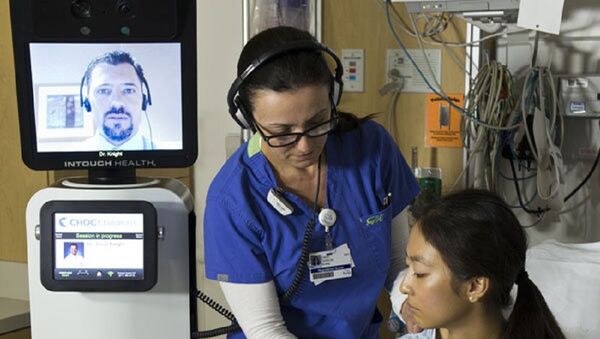Professor Alastair Denniston, co-Author of this study and Professor at the University of Birmingham shares his views on the issue.
Sputnik: Can you explain the findings of this most recent research into AI and medicine?
Alastair Denniston: This is an exciting study for our group where we reviewed the 20,000 published articles in this area from different groups around the world that were trying to evaluate or develop AI solutions to health problems - particularly diagnosis.
What we wanted to do is to try and look beyond the hype and see actually how good are these AI solutions in the real world and what was exciting was on the one hand, we were able to see that in the very best studies, when you do studies that one could trust the most, that actually AI now does match human performance in terms of diagnosis across a range of conditions; things like lung diseases, detecting cancers and so on.
The caveat to that is out of the 20,500 studies we identified irrelevant only 14 matched the kind of criteria that we would look for to be the most reliable and trustworthy studies.
The good news is that the technology can do amazing things but the kind warning for us is that there's a lot of hype around this.
There's a lot of badly designed studies and before these things come through to benefit patients we need to be really careful about looking at them in detail and checking what they really do what they claim to do.
Sputnik: How could this new technology function alongside human expertise in medicine?
Alastair Denniston: That's a great question. So I’m a consultant eye specialist working in a big, busy NHS and every day I'm seeing people who are losing their eyesight from serious blinding diseases.
What I want is tools that will help me diagnose conditions faster and help guide patients to the right treatment for them.
I see these tools as ways of speeding up that process, so they don't replace any health professionals, but they are the tools that will help us the same way as a new scanner, a new MRI, or something might help us get that diagnosis faster.
I want these tools to be helping other health professionals in their role but if I'm the patient, I also want a human to be the person to explain to me what my diagnosis is and help guide me through choices of treatment.
I think there's massive opportunity to improve healthcare but also it doesn't replace human beings.
Sputnik: Moving away from the future and into the present, could we see AI introduced into existing NHS treatment? If so, what benefits but also challenges would this raise?
Alastair Denniston: We definitely can see this coming into the NHS and other health systems. There's a certain amount of this kind of technology, not as advanced as what were looking at but there is a certain amount of what we call decision support systems already in place in the health services across the health service guiding health professionals, GPS, multiple doctors and making the right decisions.
The simple level of that might just be simply making sure you don't prescribe something to somebody who is allergic to that drug - sort of a safety net. I think what we'll see is that those kinds of tools become more and more sophisticated as the AI approaches come in.
I think where we will see a real shift is seeing actual real diagnostic algorithms, such as the retinal diagnosing algorithms developed by the Morefield Eye Hospital teams last year, working with the AI tech company DeepMind that is able to diagnose 50 different retinal diseases as accurately as expert retinal specialist at Morefield Hospital.
Bringing in that kind of capability to be happening across the board where you don't necessarily need a human expert to support that diagnosis.
You can imagine if you can disseminate that or democratize that across the NHS, that provides a resource that can mean that you can get your diagnosis instantly and tracked to the right treatment and not having to wait for review by a consultant.
We don't have enough doctors to fill all those roles that we need and if we can use AI to support our existing health professionals in a stretched NHS then this is a really exciting and innovative way of supporting those people doing their job better.


